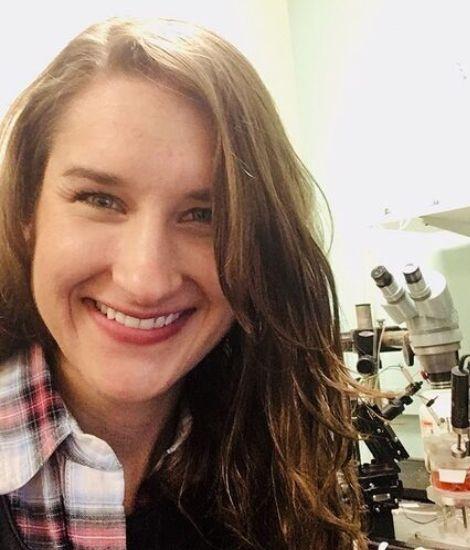My PD Story

Christine Olson, PhD
2024 Launch Award
Investigating How Gut Bacteria May Influence Levodopa Effectiveness
For most people living with Parkinson’s disease (PD), the medication levodopa plays a critical role in their daily lives. While levodopa does not treat the causes of PD, it does provide relief from movement symptoms, restoring precious agency and quality of life. Unfortunately, for some people with PD, levodopa is not effective at managing symptoms, though the reasons for this are not well understood.
Christine Olson, PhD, recipient of a Parkinson’s Foundation Launch Award and a previous Postdoctoral Fellow, suspects that a certain type of bacteria living in the gut may be a root cause. She will be investigating this suspected strain in hopes of discovering ways to use targeted antibiotics to improve levodopa use for all who need it.
Levodopa works by providing the brain with an extra source of dopamine, the neurotransmitter important for movement whose levels gradually decline throughout PD. The pills dissolve in the gut, where the levodopa molecules are absorbed and then shuttled by blood to the brain. Once in the brain, the levodopa is metabolized, or biochemically processed, into dopamine.
Why not just give people dopamine pills?
Due to its structure, dopamine cannot cross the blood-brain barrier, an important biological border that is selective about what may enter the brain for protection. Levodopa is designed so that it can pass that barrier, making it an excellent way to bring proto dopamine to the brain.
Levodopa only works if it remains unmetabolized before it reaches the brain, therefore it is often prescribed along with carbidopa, a drug that inhibits the human proteins in the body that could process it prematurely.
Dr. Olson, working in Dr. Peter Turnbaugh’s laboratory at the University of California, San Francisco, CA, a Parkinson’s Foundation Center of Excellence, recently discovered that Enterococcus faecalis (E. faecalis for short), one of the countless types of bacteria that can live in the guts of mammals, can also metabolize levodopa. This prompted her to think that maybe people with a higher amount of this bacteria in their gut have worse experiences with levodopa.
First, Dr. Olson will utilize stool samples from people with PD collected in a clinical study looking at how using rifaximin, an antibiotic for irritable bowel syndrome which can reduce E. faecalis levels in the gut, impacts disease symptoms and treatment effectiveness. She will extract and grow the bacteria from those samples in petri dishes as a simulation of the bacteria population living in each participant’s gut and see how well they can metabolize levodopa.
Dr. Olson will then compare that data to the participants’ health reports, seeing if those with more of levodopa-processing bacteria reported have a harder time with their PD symptoms than the others.
Next, Dr. Olson will use laboratory mice to investigate the biochemistry behind E. faecalis’ effects on levodopa treatment, particularly:
-
How antibiotics like rifaximin change the ability of the gut to absorb levodopa, and if the changes are influenced by levels of bacteria like E. faecalis
-
Determine if neuron changes and degradation in mice with PD-like conditions can be prevented with antibiotics like rifaximin.
Using a wide variety of tests and measurements, Dr. Olson will shed light on the specific mechanisms behind bacteria’s potential interference with levodopa, guiding advances to the medication that could improve and expand its use for all those that benefit from it.
Asked about what the Parkinson’s Foundation award means to her and what her research means to the PD community, Dr. Olson said: “Receiving this award is a vote of confidence for the potential impacts of our work to help people with Parkinson's. By evaluating whether, and to what extent, gut bacterial drug metabolism pathways contribute to patient drug response, clinicians may better target treatments tailored to every individual.”
Meet more Parkinson’s researchers! Explore our My PD Stories featuring PD researchers.
Explore More of Dr. Olson’s Research
Christine Olson, PhD, is currently furthering her research regarding the gut and Parkinson’s for which she received a Parkinson’s Foundation Postdoctoral Fellowship research grant in 2022. Read about her prior research grant below.
Preventing Intestinal Bacteria from Breaking Down Levodopa May Improve PD Symptoms
Christine Olson, PhD, of the University of California, San Francisco, received a Parkinson’s Foundation Postdoctoral Fellowship for Basic Scientists to study whether reducing an intestinal bacteria that interferes with the absorption of the Parkinson’s disease (PD) medication levodopa may improve PD symptoms.
“Our research could expand our understanding of how gut microbes contribute to Parkinson's disease drug response and progression,” said Dr. Olson. “It could increase understanding of how people with PD respond to treatment. The findings may help clinicians better target treatments tailored to the individual. In addition, we may better be able to explain why people with PD have variable drug responses.”
Parkinson’s symptoms can often be successfully managed with levodopa treatment. However, many people with Parkinson’s have limited treatment success or negative side effects. The reasons for varied reactions to levodopa treatment are unknown.
Recent research highlights that the trillions of bacteria in the human gut can significantly change how treatments like levodopa are absorbed. This also means the microbes in the gut may impact how effective levodopa can be to people with Parkinson’s.
Dr. Olson’s postdoctoral lab found that a common gut bacterium has an enzyme that may lessen levodopa’s effectiveness. Prior work in the lab found that this bacterial enzyme reduced the amount of levodopa absorbed in an animal model. These data suggest that the breakdown of levodopa caused by gut bacteria may reduce drug absorption and treatment effectiveness in people with Parkinson’s. It is possible that variations in people’s gut bacteria contribute to differences in treatment response.
Dr. Olson will evaluate whether antibiotic-induced reductions in gut bacteria lead to improvement in Parkinson’s symptoms. She will also:
- Evaluate control of enzymes in the gut that lead to breakdown of levodopa.
- Test whether a drug that can inhibit levodopa breakdownin the gut affects movement symptoms.
- Test which gut bacteria and which bacterial genes may interfere with levodopa metabolism.
Dr. Olson’s lab also has an ongoing clinical trial where people with Parkinson’s are either treated with a mild antibiotic or a placebo. She will test intestinal microbe samples from participants with PD before and after treatment. This will show which bacteria are changing in response to the antibiotic.
“We will test for the first time whether models of Parkinson’s disease and people with Parkinson’s have improved symptoms after reduction of bacterial levodopa breakdown,” Dr. Olson said.
“This research may lead to novel ways to improve Parkinson’s disease treatment strategy.”
Of her Parkinson’s Foundation grant award, Dr. Olson said, “I am honored to receive this award in support of our Parkinson's disease research. Receiving this award is a vote of confidence for the potential impacts of our work for people with Parkinson's. Additionally, this award will help support my professional development and academic career.”
Meet more Parkinson’s researchers! Explore our My PD Stories featuring PD researchers.
Related Materials
More Stories
from the Parkinson's community


